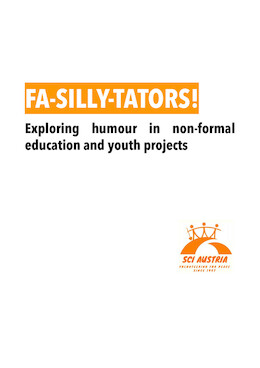Toolbox — For Training and Youth Work
All new tools in your inbox: Be the first to know about new tools for learning with our e-mail notifications.
Manual
Fa-silly-tators! Exploring humour in non-formal education and youth projects
What do we do, when we use humour in non-formal education? How can we use humour to foster group building? How can we use humour to counter rather than reinforce stereotypes and discrimination? This manual invites you to a reflection.
Aims of the tool
- raise the self-reflection of trainers and facilitators around humour in non-formal education
- give guidelines on how not to use humour in (international) youth projects
- give guidelines on how to be funny as a facilitator in (international) youth projects
Description of the tool
Non-formal education can seem pretty silly: We make participants run around a room and shout the sounds of animals. We make them pretend like they are ninjas or space aliens in order to energize them in the morning. But even though we all use humour, when we coordinate volunteering projects, run youth exchanges or facilitate seminars – we almost never stop for a moment and reflect deeply on what that actually means.
The seminar "Fa-silly-tators!", organised by SCI Austria in Vienna in November 2019, was a space for this reflection. By experiencing non-formal education methods such as drawing challenges, speed dating, brainstorming techniques and silent discussion, the participants of the seminar “Fa-silly-tators!” got to explore humour and jokes. They learned and exchanged methods and best practices on how to use humour to empower youth and marginalized groups, how to do humour from a feminist/antiracist/queer/etc. lens, when to use humour and how to deal with conflicts around it.
Available downloads:
Disclaimer
SALTO cannot be held responsible for the inappropriate use of these training tools. Always adapt training tools to your aims, context, target group and to your own skills! These tools have been used in a variety of formats and situations. Please notify SALTO should you know about the origin of or copyright on this tool.
Tool overview

http://toolbox.salto-youth.net/2866
This tool addresses
Group Dynamics, Intercultural Learning
Behind the tool
The tool was created by
Service Civil International Österreich
in the context of
Erasmus+ seminar
The tool was published to the Toolbox by
Thomas Schallhart (on 27 August 2020)
and last modified
18 May 2020
Comments
No comments have been posted yet.
If you want to comment on this tool, you need to be signed in with your MySALTO account. Sign in now